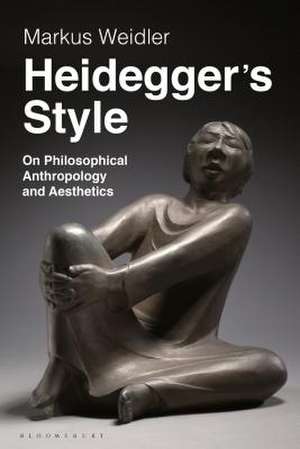Heidegger's Style: On Philosophical Anthropology and Aesthetics
Autor Markus Weidleren Limba Engleză Hardback – 23 ian 2019
| Toate formatele și edițiile | Preț | Express |
|---|---|---|
| Paperback (1) | 225.31 lei 6-8 săpt. | |
| Bloomsbury Publishing – 22 iul 2020 | 225.31 lei 6-8 săpt. | |
| Hardback (1) | 657.70 lei 6-8 săpt. | +131.50 lei 4-10 zile |
| Bloomsbury Publishing – 23 ian 2019 | 657.70 lei 6-8 săpt. | +131.50 lei 4-10 zile |
Preț: 657.70 lei
Preț vechi: 840.22 lei
-22% Nou
Puncte Express: 987
Preț estimativ în valută:
125.89€ • 136.79$ • 105.82£
125.89€ • 136.79$ • 105.82£
Carte tipărită la comandă
Livrare economică 21 aprilie-05 mai
Livrare express 14-20 martie pentru 141.49 lei
Preluare comenzi: 021 569.72.76
Specificații
ISBN-13: 9781350083394
ISBN-10: 1350083399
Pagini: 288
Dimensiuni: 156 x 234 x 24 mm
Greutate: 0.57 kg
Editura: Bloomsbury Publishing
Colecția Bloomsbury Academic
Locul publicării:London, United Kingdom
ISBN-10: 1350083399
Pagini: 288
Dimensiuni: 156 x 234 x 24 mm
Greutate: 0.57 kg
Editura: Bloomsbury Publishing
Colecția Bloomsbury Academic
Locul publicării:London, United Kingdom
Caracteristici
The author is a native German speaker with an exhaustive knowledge of the post-Kantian German philosophical tradition
Notă biografică
Markus Weidler is Assistant Professor of Philosophy at Columbus State University, USA.
Cuprins
Abbreviations Introduction: The Decisive Decade from 1936 to 1946 PART I: Back to the 1780sChapter 1 Philosophical Anthropology: Herder's Pantheism as a Subtext for Heidegger's First Schelling LectureChapter 2 Revelation: Heidegger's Second Schelling Lecture vis-à-vis Scheler and Simmel Chapter 3 "The Origin of the Work of Art": A Critique of Schiller Incognito and the Beginning of Artisan Thinking PART II: Battleground NietzscheChapter 4 Heidegger's Nietzsche Volumes: Nihilism, Physiological Aesthetics, and Volitional MetaphysicsChapter 5 Hegel and Nietzsche in Holzwege: Religious Skepticism, Witnessing, and "Subjectity" PART III: Poeticsat the "Zero Hour"Chapter 6 "Why Poets?": Cultural Rebirth and the Poetic Inception of PietyChapter 7 The Letter on Humanism: Modulations of the German Poet in a Demonic Text CODA: Being and Time as an "Old-fashioned" Book?Chapter 8 Freedom for Death and Prussian Resolve Conclusion: Faith and Fanaticism after Heidegger NotesSelected Bibliography Index
Recenzii
Rarely are books this nuanced also this comprehensive. Anyone interested in Heidegger should read this book. Everyone attempting to think about aesthetics or religion after Heidegger must read it.
Weidler's deeply scholarly book situates Heidegger in the history of modern German thought. Weidler corrects the prevalent tendency to read Heidegger out of context and offers us historically grounded arguments for re-assessing Heidegger's problematic relation to the political. This book, which every Heidegger scholar will benefit from, proves the importance of philosophical anthropology and theology for Heidegger's development; it shows that Heidegger's conception of the holy is constructed as an alternative to the German Idealist effort to personalize the absolute. A refreshing and important contribution to Heidegger studies and the history of contemporary philosophy.
Weidler's deeply scholarly book situates Heidegger in the history of modern German thought. Weidler corrects the prevalent tendency to read Heidegger out of context and offers us historically grounded arguments for re-assessing Heidegger's problematic relation to the political. This book, which every Heidegger scholar will benefit from, proves the importance of philosophical anthropology and theology for Heidegger's development; it shows that Heidegger's conception of the holy is constructed as an alternative to the German Idealist effort to personalize the absolute. A refreshing and important contribution to Heidegger studies and the history of contemporary philosophy.
